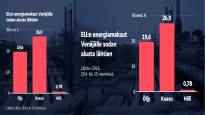The European Commission has condemned the ruble trade of gas companies. Finland’s Gasum will soon have to decide how it will respond to Russia’s demand for ruble payments.
Elli-Alina Hiilamo,
Anna Karismo
Among them is Uniper, which is owned by the Finnish energy company Fortum. CFO of Uniper Tiina Tuomela has said the company considers the new payment arrangement legal.
However, the EU Commission strongly condemns the ruble trade of gas companies. It has warned that companies will violate EU sanctions if payments are made as the Kremlin wishes.
What is it about?
Russia’s demand for ruble payments for gas trade is not new. This is Putin’s decree that “unfriendly countries”, ie EU countries, must pay for their gas in rubles or else gas supplies will be cut off.
Russian gas company Gazprom sent letters to European energy companies at the end of March. It gave each buyer their own deadline by which to reply to the letter.
For example, the Finnish state-owned company Gasum will respond to the Russian demand in May, when its next installment will fall. The exact date the company will not disclose to the public.
Kremlin spokesman Dmitry Peskov has said that supply disruptions are imminent in late April and early May.
How does ruble trading work?
In practice, this is a payment arrangement. Russia’s demand is that the European gas company set up two accounts with the Russian state-owned Gazprombank. Fortum, which is owned by Fortum, for example, has already set them up.
To another Gazprombank account, the Western company transfers payments in euros or dollars, after which Gazprombank transfers the money to another account in rubles. It does this by borrowing rubles from the Central Bank of Russia.
Russia considers the deal to have taken place only after the money has been transferred to the Western company’s ruble account. This, according to the EU Commission, makes payments a ruble trade.
Do ruble payments violate sanctions?
The Commission considers that the charges violate international sanctions against the Russian Central Bank. The payment by a Western energy company can be considered a direct loan to the Central Bank of Russia.
In addition, the Russians can hold the amount in Western currency for as long as they want. According to the Commission, there have been delays in the transfer of funds.
Senior Adviser to the Bank of Finland Laura Solanko considers that the payment of goods in rubles is not in itself against sanctions.
– However, sanctions are political decisions. If the EU leadership interprets this as anti-sanctioning, then European companies should take this view.
Gasum Finland has not yet stated its own interpretation of whether the accounts in Gazprombank violate international sanctions or whether the company intends to set up such an account itself. It will not decide until May.
Until now, European energy companies have paid for their gas purchases into accounts held by Gazprom in European banks. Almost everyone lived 97% (switch to another service) gas purchases have been paid for in euros or dollars.
Why does Putin want payments in rubles?
This is above all a political project, as it is difficult to find any financial sense in the arrangement, says Solanko of the Bank of Finland. According to him, it may also simply be a matter of whim, the implementation or rationality of which has not been properly thought out.
– There is an ongoing battle of spirits over who gets the number of trading conditions. Gazprom wants to unilaterally change something in the agreement, and from the customer’s point of view, the question is whether we want to agree to it.
It may also be said of the dismantling attempt that different limits have been set for Western companies to approve ruble payments. On the other hand, the deadlines may be due to energy companies’ gas bill maturity schedules.
For example, the Brussels-based economic research company Bruegel rate (switch to another service)that the payment system introduced by Putin is intended to circumvent Western sanctions.
Is the method of payment for gas relevant?
The cornerstone of financing the Russian economy and war is the country’s oil and gas trade. Yet they have so far been excluded from sanctions.
According to Laura Solango, the Bank of Finland, ruble payments for gas supplies are a “flower stalk” for the big picture, to which much attention has been paid.
– It would also be strange if the EU started to micromanage the rules for calculating foreign trade. If we have a problematic commodity, it would be more straightforward to suspend its import.
Solanko also points out that the oil trade is more important than the gas trade in terms of financing the Russian economy and war. At its peak, crude oil and petroleum products account for about 40 percent of Russia’s budget revenue, while gas accounts for about ten percent, he says.
– Oil is what we should focus on.
EU energy ministers have been invited to an extraordinary meeting in Brussels on Monday. Over the weekend, the European Commission will hold a debate with the Brussels delegations of the 27 member states on the future of Putin’s gas and oil.
You can discuss the topic until 11 p.m. Saturday night.
